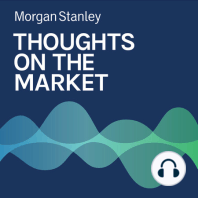3 min listen

US Energy: The Minerals and Materials at Risk
US Energy: The Minerals and Materials at Risk
ratings:
Length:
4 minutes
Released:
Apr 11, 2024
Format:
Podcast episode
Description
With global temperatures rising and an increasing urgency to speed progress on the energy transition, our Head of Sustainability Equity Research examines the key materials needed—and the risks of disruption from US-China trade tensions.----- Transcript -----Welcome to Thoughts on the Market. I’m Laura Sanchez, Head of Sustainability Equity Research in the Americas. Along with my colleagues bringing you a variety of perspectives, today I’ll discuss a highly topical issue: the impact of US-China trade tensions on the energy transition. It is Thursday, April 11, at 12 pm in New York.Last week, you may have heard my colleagues discuss the geopolitics at play around US-China trade tensions and the energy transition. Today I’m going to elaborate on that discussion, spearheaded by my team, with a deeper dive into the materials and minerals at risk and exactly what is at stake for several industries in the US.When we talk about clean technologies such as electric vehicles, energy storage and solar, it is important to note that minerals such as rare earths, graphite, and lithium — just to name a few — are crucial to their performance. At present, China is a dominant producer of many of those key minerals, whether at the mining level – which is the case with gallium, rare earths and natural graphite; at the refining level – the case for cobalt and lithium; or at the downstream level – that is, the final product, such as batteries and EVs.If trade tensions between the US and China rise, we believe China could implement new or incremental export bans on some of these minerals that are key for western nations’ energy transition as well as for their broad economic and national security.So, we have analyzed over 10 materials and found that the highest risks of disruption exist for rare earths and related equipment, as well as for graphite, gallium, and cobalt. Some minerals have already seen certain export bans but given the lack of diversification across the value chain, we actually see the potential for incremental restrictions.So, this led us to ask our research analysts: how should investors view rising trade tensions in the context of clean technologies’ penetration, specifically?While electric vehicles appear most at risk, we see the largest negative impacts for the clean technology sector as well as for large-scale renewable energy developers. This has to do with China dominating around 70 per cent of the battery supply chain and still having strong indirect ties in the solar supply chain. But there are important nuances to consider for renewable energy developers, such as their ability to pass the higher costs to customers, whether this higher cost could hurt the economics of projects and therefore demand, and the unequal impacts between large and small players – where large, tier 1 developers could actually gain share in the market as they have proven to navigate better through supply chain bottlenecks in the past.On the Autos side, slower EV adoption would naturally impact sentiment on EV-tilted stocks; but as our sector analyst highlights, this could also mean lighter losses near term, as well as market share preservation for the largest EV players in the market. US Metals & Mining stocks would likely see positive moves as further trade tensions incentivize onshoring of mining and increase demand for US-made equipment.Given strong bipartisan support in the US for a more hawkish approach to China, our policy experts believe that the US presidential election is unlikely to lead to easing trade restrictions. Nonetheless, in terms of the energy transition theme, a Republican win could create volatility for trade and corporate confidence, while a Democrat administration would be more sensitive to the balance between protectionism and achieving global climate goals.Thanks for listening. If you enjoy the show, please leave us a review wherever you listen to podcasts and share Thoughts on the Market with a friend or colleague today.
Released:
Apr 11, 2024
Format:
Podcast episode
Titles in the series (100)
Andrew Sheets: For Markets, Signs, Signs, Everywhere Signs by Thoughts on the Market